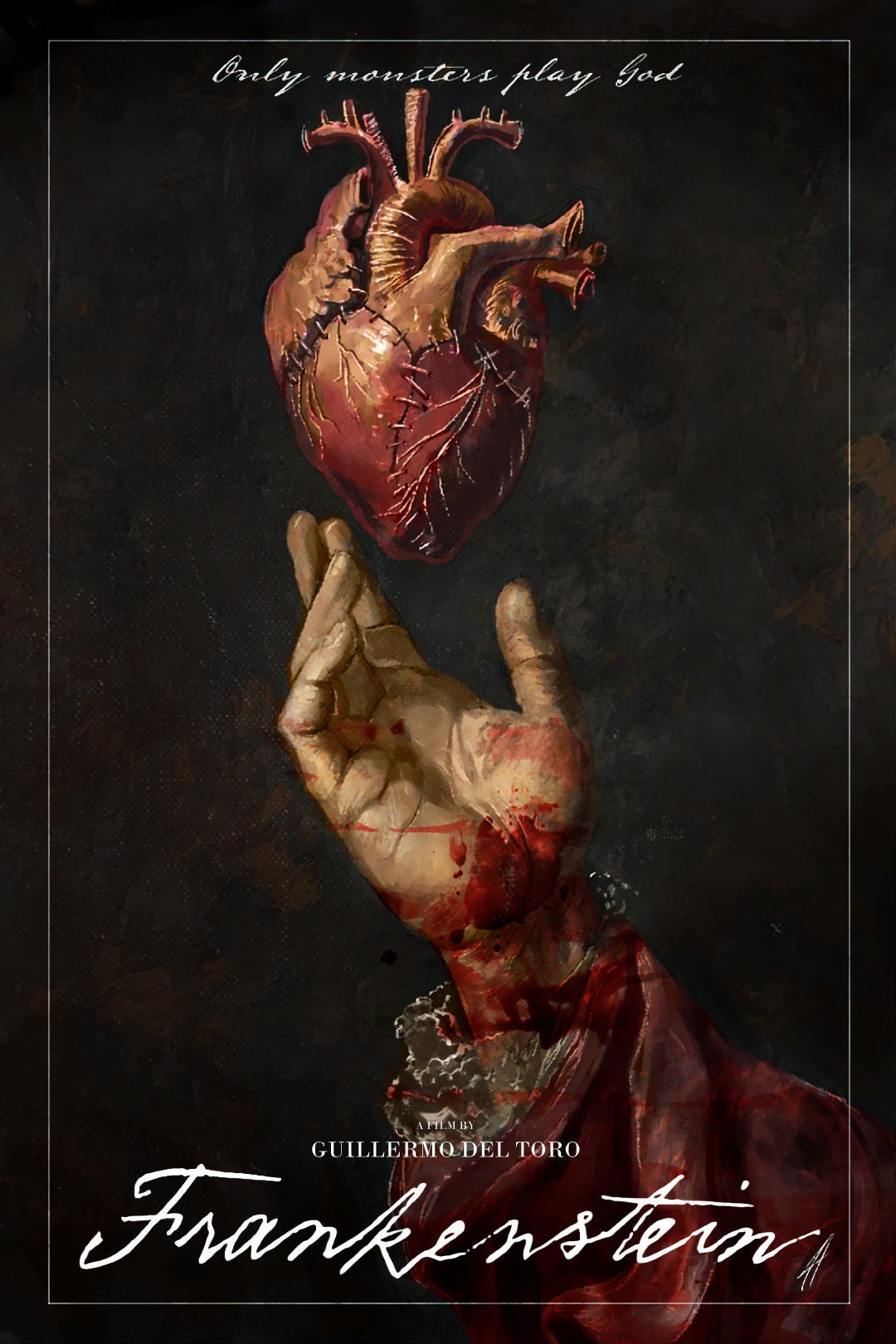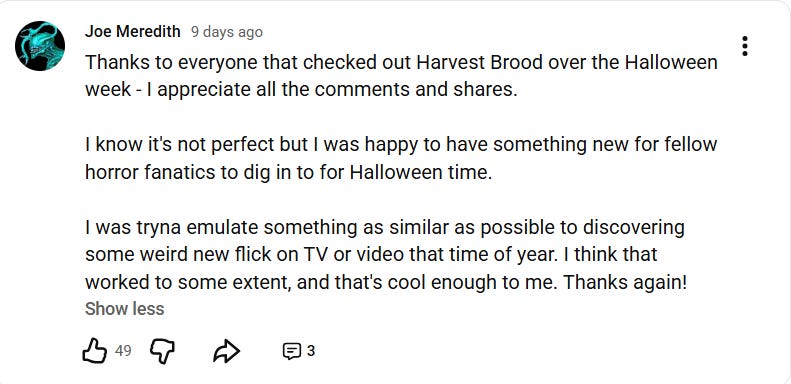Only Monsters Play God
And We are the Monsters, Baby!
This week, I’m hard at work on Digital Darkness II, the usual promo stuff, and my day job. DDII is sitting at 18,000 words, and I’m hoping to reach 50,000 by the time it’s finished. I’ve got a big twist planned, something that will take us back to what seemed like a red herring in the first book, and I’m crazy excited about it.
I convinced Jean to watch Guillermo del Toro’s Frankenstein with me. We got about halfway through before we needed to go to bed, so it took us two nights to finish it. The film is elegant and epic in scope, with believable performances and colors that pop (especially those reds, which feel too noticeable not to be symbolically significant). I also appreciate the emphasis on how disgusting the good doctor’s endeavor would be if done in real life.
The latter half is heavy on the pathos and brutality. Jean had a hard time with it, and to be honest, if I’d known how gory it is, I would have watched it on my own. Now, I owe her a night or two of watching a movie or show she prefers. She isn’t a horror fan, so I try to be selective with what I show her. She’s liked what she’s seen from Guillermo del Toro, so I assumed she would like Frankenstein. She didn’t dislike it, but she’s completely unfamiliar with the story outside of the creature’s status as a cultural icon, so she was unprepared for how sad the story is.
I have always adored Frankenstein, and my appreciation for it has only grown as I have grown. If you’ve ever felt lonely, rejected, or different, the creature is someone with whom you can easily identify. But the beauty of Frankenstein is that it isn’t black and white because if you’ve ever felt single-mindedly passionate about something, only to have it not turn out the way you hoped, then you will see yourself in the doctor. Hopefully, you’ll be more compassionate than Victor at his worst moments, but in the context of a horror film, his cruelty lends much to the work’s effectiveness.
As a father, I see it as a story about how we must do better by our children (i.e., our creations). They won’t be what we expect, and sometimes they’ll remind us a little too much of ourselves. The key is to remember that this is okay, and that they’ll still need us, especially in their formative years. The creature needed a friend, yes, but more than that, he needed his father.
Frankenstein isn’t a story for these modern times: an age of meme-speak when everything is reduced to team sports (Team Edward, Team Jacob, etc.). If you are firmly Team Doctor or firmly Team Creature, I think you missed the point. In a truly effective story, you can understand the actions of its characters, even if you find said actions abhorrent. This is something Mary Shelley got right in her novel, and it’s something pulled off masterfully in del Toro’s film.
Several years ago, I wrote an essay called “Workshop of Filthy Creation” where I posited that Mary Shelley’s novel was a metafictional story about writing, specifically about the process of writing a horror novel. I don’t know if I still stand by that thesis, but it was a fun thought experiment, and to this day, it remains the only piece of nonfiction for which I’ve been paid professional rates.
Oddly enough, I do think there is some of that going on in del Toro’s adaptation. Meaning, the film at times feels like a depiction of what it may be like to make a Hollywood film. We’ve even got the wealthy benefactor who wants to be part of the final product, even though the doctor knows Herr Harlander’s diseased flesh is less than worthy (it is telling that the real meat of the story begins after Harlander meets a grisly end at the bottom of a shaft).
I still have a lot to meditate on when it comes to this movie, but it might be my favorite adaptation of the novel. It is extremely heavy, though, so I desperately needed a palette cleanser. Thankfully, my pal and colleague Judith Sonnet sent me a link to a movie called Harvest Brood. It’s 54 minutes, free on YouTube, and so much fun to watch. Its creator Joe Meredith had this to say about it:
I love that because that’s exactly how this movie feels, like something weird you’d catch on late-night TV in October. Shot like a trashy mockumentary (complete with interviews and splatter film reenactments), Harvest Brood tells the story of a series of bizarre murders that take place in a small town in October 2006. The main narrative is wrapped in lore reminiscent of C.H.U.D. (think toxic waste and cryptids). In addition to the mockumentary elements, the film employs analog horror techniques and features homemade special effects. Meredith is no Brian Paulin in that latter respect, but I don’t think that was his goal. Rather, he leans into the cheapness and emerges with something artful because of it.
This was a perfect juxtaposition to Guillermo del Toro’s Frankenstein, which had much higher production values and thus higher ambitions. However, to compare the two, to judge them within the same parameters, is to miss the point. That said, I imagine Joe Meredith is much kinder to his creation than Victor Frankenstein is, and I bet he loves it more than del Toro loves some of his studio films. While I wouldn’t mind del Toro’s money or clout with the powers-that-be, I am much more at home, much more aligned with Meredith’s loving, amateurish approach to making art.
If you too need a palette cleanser from the heaviness of Frankenstein without abandoning the horror genre completely, check out Harvest Brood below.
Until next time: love, light, and thanks.




Great article, Lucas. I love talking with you about Horror films and such. You've got a great sense of art as well as the craft. If you have not yet seen Frankenstein: The True Story, I can lend you my DVD. It blew my mind when I saw it on TV as a kid while waiting in a Sears Automotive waiting room with my family.
Loved this take. Del Toro is an absolute genius when it comes to storytelling and cinematography. From the color palette to the palpable emotion displayed on screen it was a hit through and through for me. I think fatherhood is a great allegory too. When you have a child you’re put in a privileged, but highly sensitive position. Your words can give hope, or create total anguish.